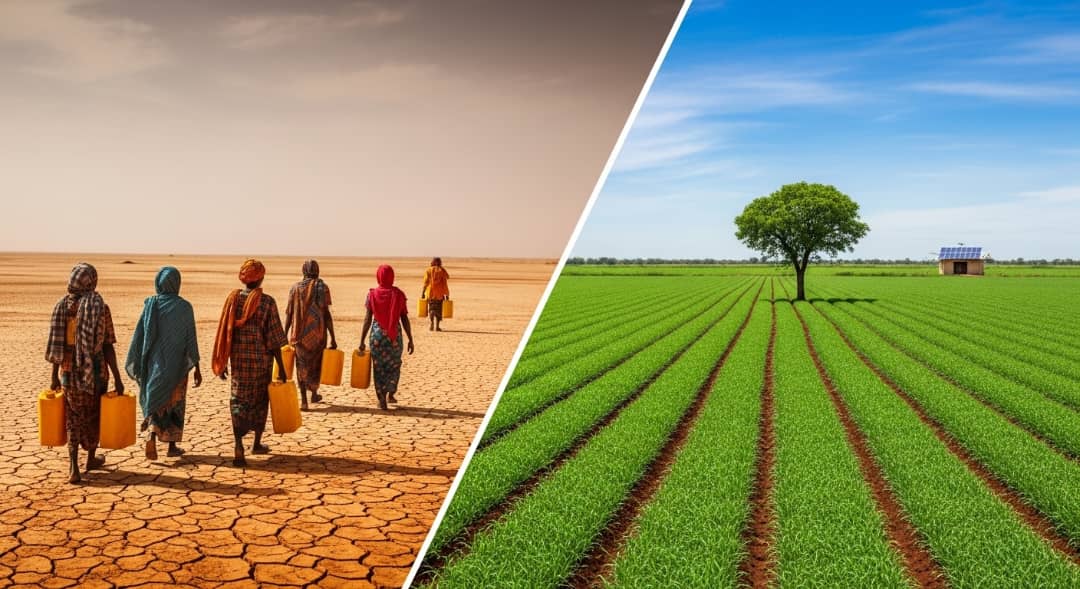✍️ Authored by the ACSPR Team
Shaping Africa’s Future with Evidence, Equity, and Innovation for Impact
Shaping Africa’s Future with Evidence, Equity, and Innovation for Impact
Climate change is no longer a distant environmental concern — it is a human story. It affects how we grow food, access water, protect our homes, power our communities, and safeguard our health. Across the world, weather extremes are becoming more common, and the impacts are increasingly personal.
From shifting seasons to rising temperatures, the climate crisis is rewriting how societies function. And as we confront this reality, one truth becomes clear:
👉 People, climate, and the planet are deeply interconnected and the choices we make now will shape generations to come.
🔥 Climate Change: A Global Challenge with Human Faces
Scientists agree that the climate system is warming, largely due to human activities. We see the evidence everywhere — melting glaciers, rising seas, stronger storms, and record-breaking heatwaves.
But behind these environmental shifts are human consequences:
- 📉 Food insecurity
- 🏥 Changing health risks
- 💧 Water scarcity
- ⚡ Threats to energy systems
- 🌱 Loss of biodiversity
- 🏚️ Climate-driven migration
No country is immune yet the impacts are not equal.
🌍 Africa: Least Responsible, Most Affected
Although Africa contributes less than 4% of global greenhouse gas emissions, it faces some of the harshest impacts. Agriculture, pastoralism, fishing, and hydropower — key economic pillars — are all climate sensitive.
East Africa illustrates this vulnerability clearly. Droughts, floods, and unpredictable rainfall are becoming more frequent, jeopardizing food production and water supply.
In Uganda, the effects are visible:
● Floods in eastern districts
● Landslides in Mount Elgon region
● Drying wetlands
● Shifts in malaria transmission
● Reduced hydropower output
● Floods in eastern districts
● Landslides in Mount Elgon region
● Drying wetlands
● Shifts in malaria transmission
● Reduced hydropower output
For millions of Ugandans whose livelihoods depend on rainfall and natural resources, these changes threaten survival.
🍽️ Food Systems Under Pressure
More than 80% of farmers in Sub-Saharan Africa depend on rain-fed agriculture. As rainfall becomes less predictable, food production becomes riskier. In recent years, prolonged droughts devastated staple crops across the region, leaving millions food insecure.
In Uganda, changing weather patterns are affecting key crops like maize, coffee, beans, and bananas — crops that fuel both households and national economies.
The result?
📌 Lower yields → lower income → higher food prices → greater hunger.
🦟 Health Risks Rising
A warming climate also affects disease patterns. Mosquito-borne illnesses such as malaria and dengue are expanding into new areas due to higher temperatures and increased humidity.
For Uganda —already among the world’s highest malaria burden countries — this trend poses a serious health threat.
Heatwaves are also increasing cases of dehydration, heart strain, and occupational illness, especially among outdoor workers such as builders, farmers, and street vendors.
💧 Water & Energy: The New Vulnerability
Climate change disrupts rainfall cycles, affecting rivers, lakes, and groundwater.
As water levels drop, hydropower supplies decline — a major concern for East African countries that rely heavily on water-dependent electricity.
Uganda has already experienced power shortages during drought periods, forcing greater reliance on expensive and carbon-intensive alternatives.
🏚️ Climate Migration Is Increasing
When water is scarce, crops fail, or homes are destroyed by floods, families are forced to move.
Weather-related disasters displaced more than 30 million people globally in 2022 alone, many of them in Africa.
In Uganda, communities in Kasese, Teso, Karamoja, and Bududa continue to face displacement from floods and landslides.
Climate change is now not only an environmental issue — it is a humanitarian issue.
🌱 The Planet Has Limits — And We’re Pushing Them
Scientists studying planetary boundaries warn that humanity has already crossed several environmental thresholds - including biodiversity loss, land degradation, and climate change. When these natural systems destabilize, the consequences ripple across every aspect of life.
Healthy ecosystems are not optional — they provide clean air, fertile soils, fresh water, pollination, and natural climate regulation.
When ecosystems collapse, societies weaken.
💡 Solutions Exist and People Are Leading Them
Even as risks grow, innovation and resilience are emerging across communities.
✔️ Community-Led Adaptation
Farmers are adopting drought-resistant crops, water harvesting, agroforestry, and conservation farming techniques. Local early-warning systems are helping families prepare for extreme weather.
✔️ Renewable Energy Advancement
Solar mini-grids, improved cookstoves, and off-grid solutions are powering rural homes, reducing deforestation, lowering emissions, and improving health.
✔️ Nature-Based Solutions
Wetland restoration, reforestation, and landscape rehabilitation are revitalizing ecosystems, improving carbon storage, and protecting biodiversity.
The most powerful climate solutions combine local knowledge, innovation, and inclusive planning.
🛠️ What Must Happen Next
Building a resilient and sustainable future requires coordinated action across policy, education, finance, and community systems. Some key priorities include:
- 🧭 Strengthening climate education
- 🌾 Scaling climate-smart agriculture
- 🧱 Investing in resilient infrastructure
- ⚡ Accelerating renewable energy adoption
- 🌿 Protecting biodiversity and restoring ecosystems
These approaches protect livelihoods, safeguard natural resources, and support long-term economic progress.
🌍 A Future Worth Building
The climate crisis is not only about rising temperatures! it is about justice, opportunity, and survival.
Protecting the planet means protecting communities, culture, health, and generations that will inherit our decisions.
Uganda - and Africa - are not powerless. With science-driven policy, community-led solutions, and collaborative investment, we can build a future that is resilient, equitable, and sustainable.
The question is no longer whether climate change is happening.
👉 The question is how boldly, how quickly, and how collectively we choose to respond.

